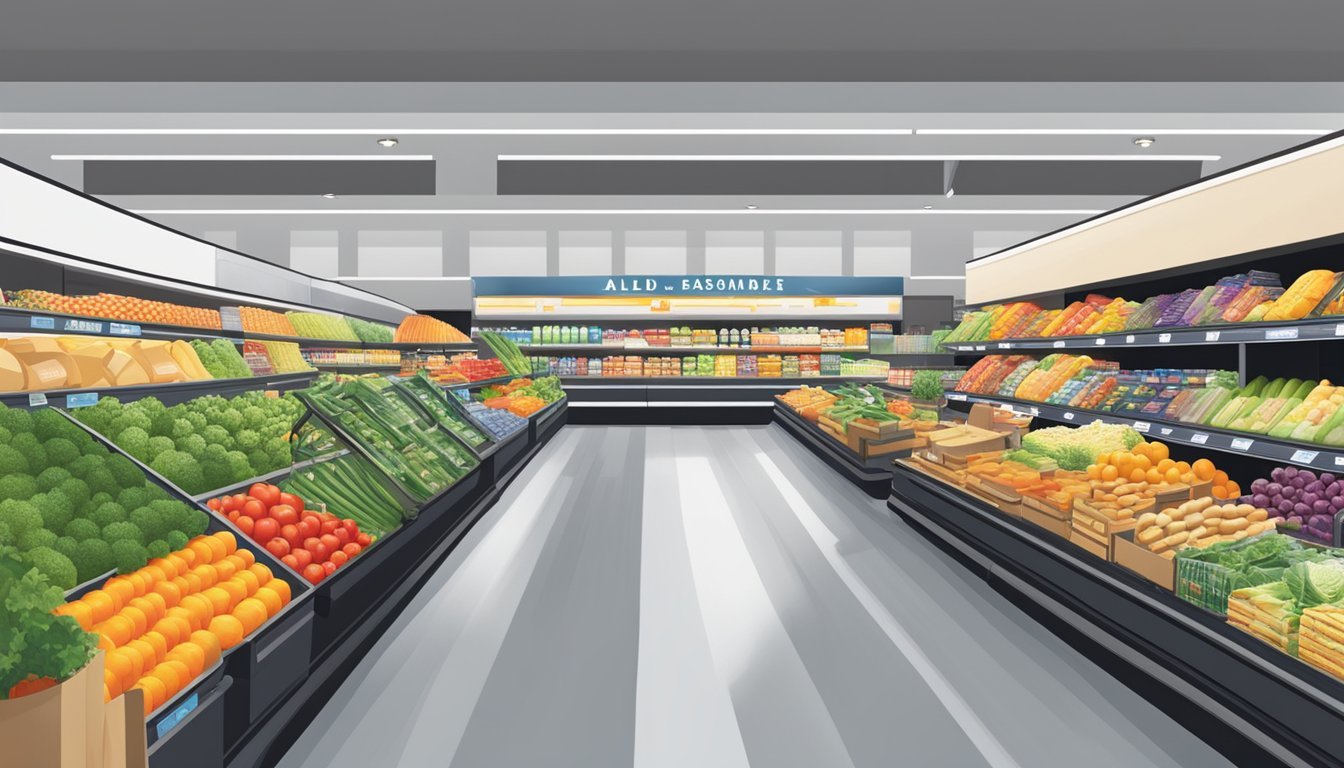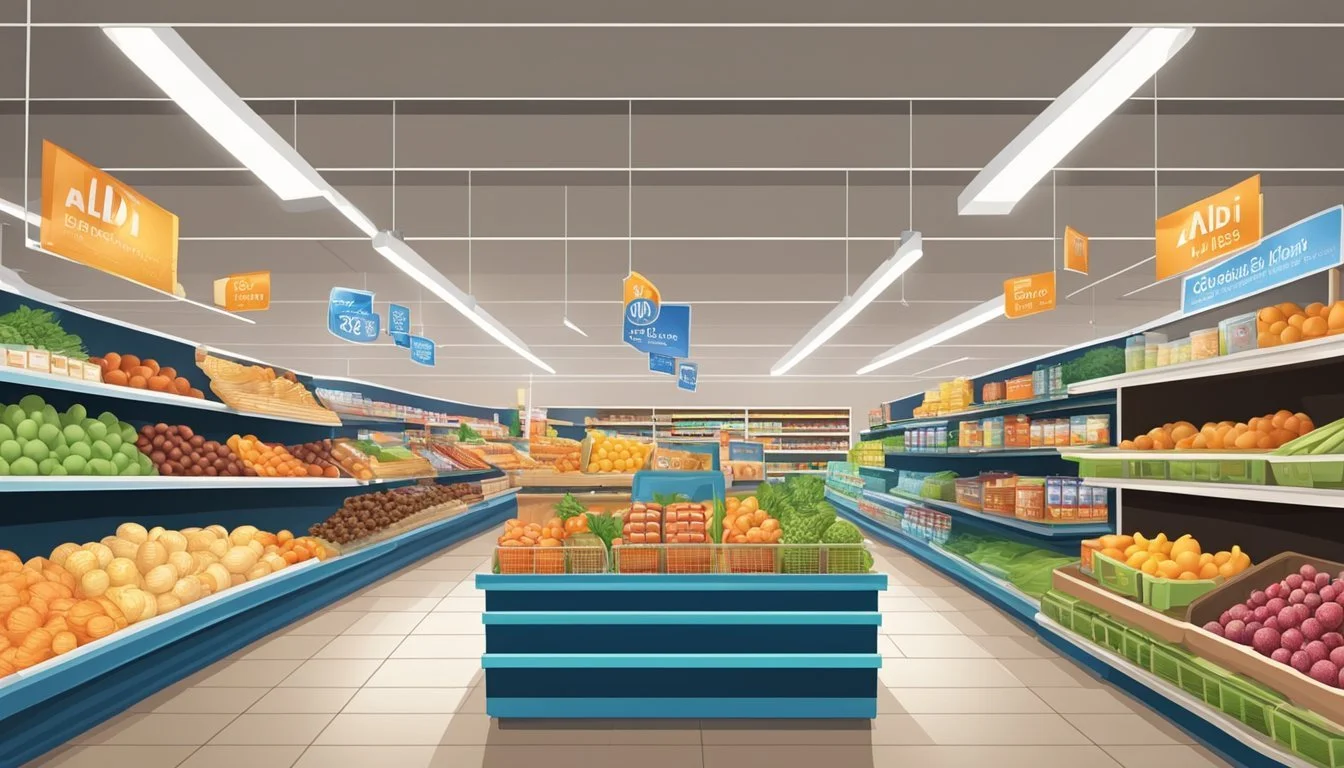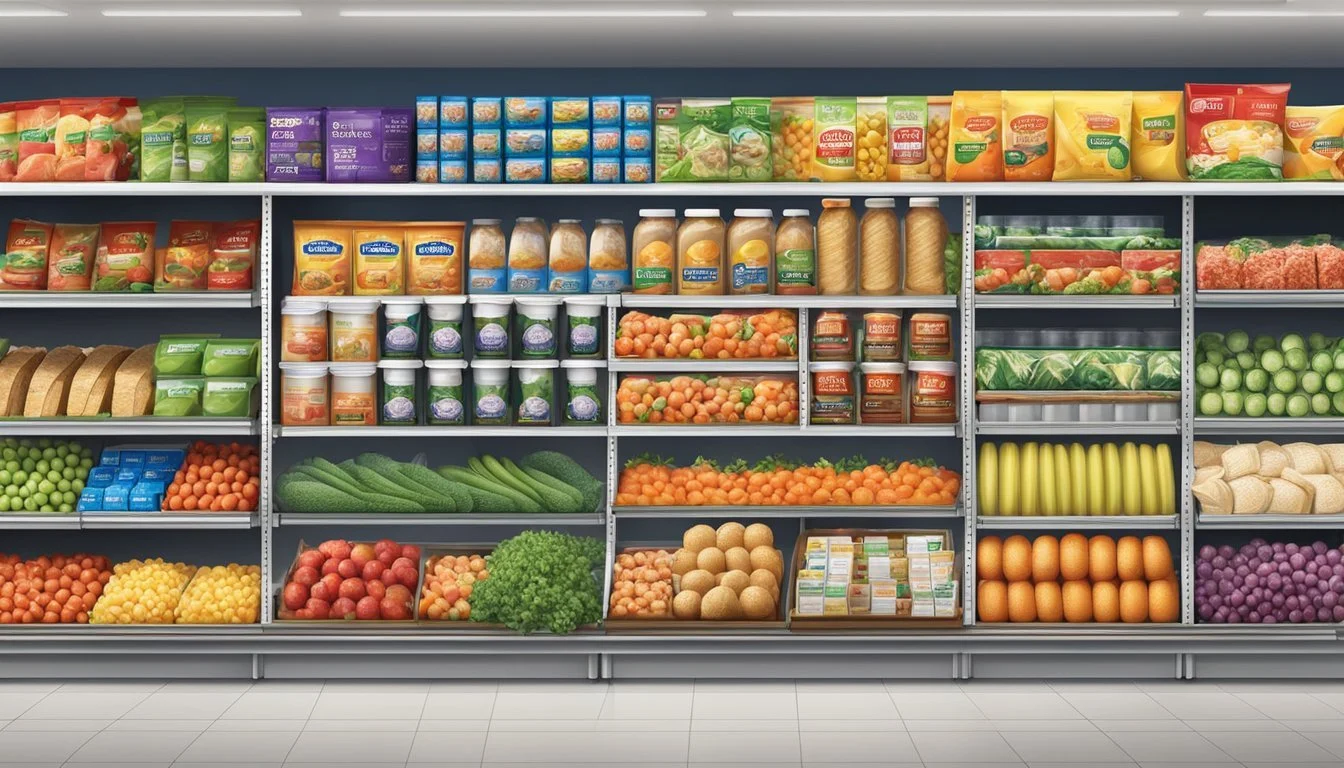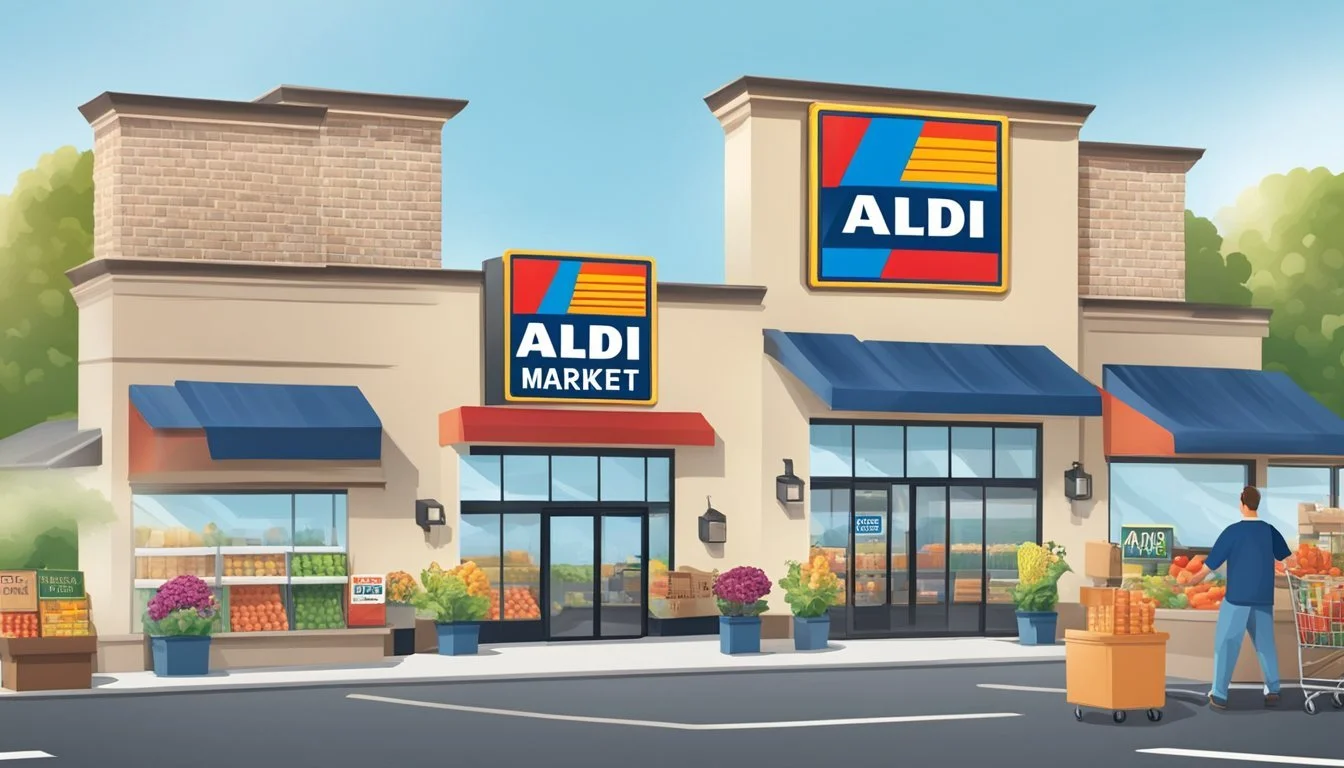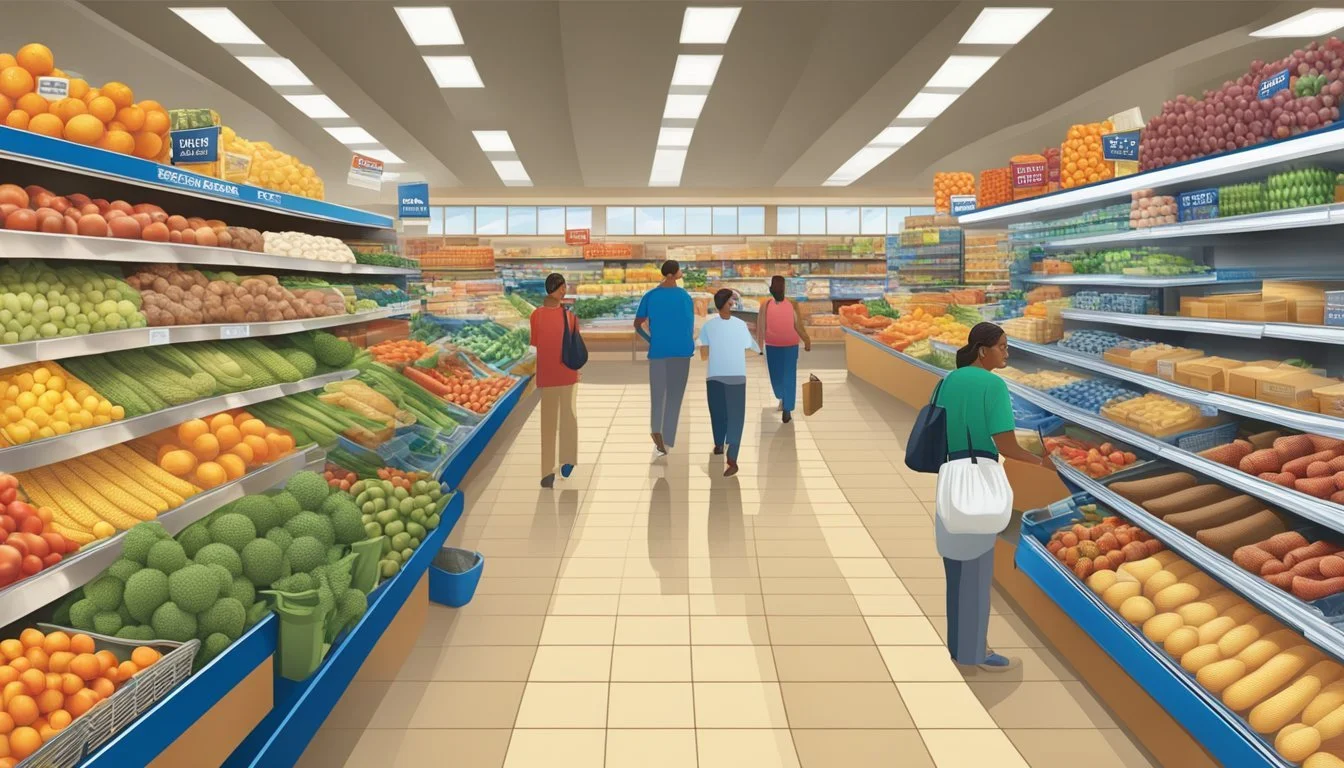Aldi vs Demoulas Market Basket
A Comprehensive Price and Quality Comparison
Aldi and Demoulas Market Basket are two grocery chains that have gained attention for their competitive pricing strategies. Both stores aim to provide customers with affordable options, but they take different approaches to achieve this goal.
Market Basket consistently outperforms Aldi in terms of affordability and quality, according to consumer data firm Dunnhumby's 2022 study. This regional chain, primarily located in the Northeast, has managed to keep prices low through efficient operations and high-volume merchandising. Market Basket's prices are estimated to be about 18% lower than the average grocery store.
Aldi, known for its no-frills approach and private-label products, also offers significant savings compared to traditional supermarkets. The German-owned chain has expanded rapidly across the United States, appealing to budget-conscious shoppers. While both stores prioritize value, customers may find differences in product selection, store atmosphere, and overall shopping experience between Aldi and Market Basket.
History and Background
Aldi and Demoulas Market Basket have rich histories spanning decades. Both companies started as small family businesses and grew into major regional grocery chains, though their paths to success differed significantly.
Aldi's Roots and Expansion
Aldi traces its origins to 1946 when brothers Karl and Theo Albrecht took over their mother's store in Essen, Germany. By 1960, they owned 300 stores and split the company into Aldi Nord and Aldi Süd. Aldi entered the US market in 1976, opening its first store in Iowa.
The chain expanded rapidly across the country. Aldi's no-frills approach and focus on private label products allowed it to keep prices low. By 2024, Aldi operated over 2,000 stores in 36 states.
Aldi's international presence grew as well. The company now has over 10,000 stores worldwide in countries like the UK, Australia, and China.
The Growth of Demoulas Market Basket
Demoulas Market Basket began in 1917 when Greek immigrants Athanasios and Efrosini Demoulas opened a small grocery store in Lowell, Massachusetts. Their sons Telemachus and George took over in 1954, purchasing the store for $15,000.
The brothers expanded the business rapidly. By the 1970s, Market Basket had grown to 15 stores. The company faced internal conflicts in the 1990s over ownership and leadership.
Despite these challenges, Market Basket continued to grow. As of 2024, the chain operates 88 stores across New England. The company remains family-owned and is known for its low prices and loyal customer base.
Business Models and Store Policies
Aldi and Market Basket employ distinct strategies to attract customers and maintain their competitive edge. These approaches shape their operations, pricing, and relationships with employees and communities.
Aldi's Efficiency Approach
Aldi focuses on streamlining operations to minimize costs. The company stocks a limited selection of primarily private-label products, reducing expenses associated with brand-name items. Stores are compact, typically 12,000 square feet, with a no-frills layout.
Employees are cross-trained to handle multiple tasks, increasing productivity. Aldi's cart rental system and "bring your own bag" policy further cut overhead costs. These savings are passed on to customers through lower prices.
The chain's efficiency model has proven successful. In 2021, Aldi's U.S. sales grew by 15%, outpacing the industry average of 2-3%. This approach has allowed Aldi to capture 3% of the U.S. grocery market.
Market Basket's Community Focus
Market Basket takes a different approach, emphasizing community engagement and employee satisfaction. The company maintains strong relationships with local suppliers, offering a wide variety of products including both national brands and private labels.
Market Basket is known for its employee-friendly policies. The chain provides competitive wages and benefits, fostering loyalty among staff. This strategy results in low turnover rates and experienced employees who provide better customer service.
The company's commitment to low prices stems from efficient operations and a willingness to accept lower profit margins. In 2022, a study by Dunnhuby ranked Market Basket as the top grocery chain for handling inflation while maintaining affordability and quality.
Price Comparison and Value
Aldi and Market Basket are renowned for their competitive pricing strategies. Both stores prioritize keeping costs low for customers, but employ different approaches to achieve this goal.
Overall Pricing Strategies
Aldi focuses on a no-frills shopping experience, cutting overhead costs to offer lower prices. The store stocks primarily private-label products and limits product variety to keep prices down. Market Basket, on the other hand, maintains low prices while offering a wider selection of name-brand items. Market Basket's prices are typically 18% lower than the average grocery store, while Aldi's prices can be up to 20% lower than competitors.
Both chains have managed to keep prices relatively stable despite recent inflation. Aldi achieves this through its efficient operations and limited selection. Market Basket leverages its regional focus and strong supplier relationships to maintain low prices.
Price Breakdown by Product Categories
Aldi often beats Market Basket on prices for staple items like milk, eggs, and bread. The German discounter's private-label products are consistently cheaper than national brands found at Market Basket.
Market Basket, however, offers competitive prices on fresh produce and meat. Their larger stores allow for a wider selection in these categories, often at prices comparable to Aldi's limited offerings.
For packaged goods and household items, Aldi typically has the edge. Their Aldi Finds program offers weekly deals on non-grocery items at significant discounts.
Market Basket shines in its regular sales and promotions, which can result in substantial savings for savvy shoppers. The chain's loyalty program provides additional discounts and personalized offers.
Range of Products and Quality
Aldi and Market Basket offer distinct product selections and quality levels. Each store has its own approach to providing value while maintaining product standards.
Product Variety and Specialty Items
Aldi features a curated selection of mostly private-label products. Their stores stock around 1,400 core items, focusing on essentials and rotating seasonal offerings. Aldi's specialty items include European imports and limited-time "Aldi Finds."
Market Basket carries a broader range of products, including more national brands. Their stores typically offer 20,000-25,000 items. Market Basket provides a wider variety of specialty and ethnic foods, catering to diverse customer preferences.
Aldi's compact stores may limit choice but streamline shopping. Market Basket's larger format allows for more options in each category.
Quality of Produce, Meat, and Grocery Items
Both chains prioritize quality, but their approaches differ. Aldi's produce section is smaller but emphasizes freshness. Their meats are often competitively priced and of good quality. Aldi's private-label groceries frequently match or exceed national brand quality.
Market Basket is known for its fresh produce department, offering a wide selection of fruits and vegetables. Their meat counter provides more variety, including store-cut options. Market Basket's grocery items span from budget to premium options.
Aldi's quality control is strict, with products undergoing rigorous testing. Market Basket relies on a mix of national brands and their own labels to ensure quality across price points.
Customer Shopping Experience
Aldi and Market Basket offer distinct shopping experiences tailored to their unique business models. Both aim to provide value, but their approaches differ in store layout, product selection, and checkout processes.
Store Layout and Design
Aldi stores feature a compact, no-frills design with wide aisles and minimalist shelving. Products are often displayed in their original shipping boxes to reduce stocking time. The layout is consistent across locations, making it easy for shoppers to navigate.
Market Basket stores are typically larger, with a more traditional supermarket layout. They offer wider product variety and specialty departments like bakeries and delis. The stores have a local, community-focused feel with regional products and familiar brands prominently featured.
Aldi's streamlined approach appeals to shoppers seeking efficiency, while Market Basket caters to those who prefer a full-service grocery experience.
Checkout and Convenience
Aldi prioritizes speed at checkout. Cashiers are known for their rapid scanning, and customers bag their own groceries at a separate counter. This system keeps lines moving quickly but requires more effort from shoppers.
Market Basket employs baggers and offers a more conventional checkout experience. They often have more registers open to manage customer flow during busy periods.
Both chains have made efforts to enhance convenience. Aldi has introduced self-checkout in some locations, while Market Basket offers online ordering with curbside pickup options at select stores.
Savings and Discount Strategies
Both Aldi and Market Basket employ various tactics to provide customers with significant savings. These strategies range from loyalty programs to special promotions and bargains.
Loyalty Programs and Promotions
Aldi takes a unique approach by avoiding traditional loyalty programs. Instead, they focus on maintaining consistently low prices across their stores. This strategy eliminates the need for customers to track points or clip coupons.
Market Basket, on the other hand, offers a more conventional loyalty program. Customers can sign up for a Market Basket card to access exclusive deals and discounts. These promotions often include percentage-off savings on specific items or categories.
Both stores frequently run weekly specials on popular products. Aldi's "Aldi Finds" feature limited-time deals on seasonal items and unique products. Market Basket regularly advertises its "Market Basket Deals" in local circulars and online.
Special Discounts and Bargains
Aldi is known for its "Double Guarantee" policy. If customers are not satisfied with a product, Aldi will replace the item and refund the purchase price. This policy demonstrates confidence in their product quality while offering customers peace of mind.
Market Basket employs a different strategy, often using bulk discounts to attract shoppers. They frequently offer "Buy One, Get One Free" deals on various items. The chain also provides significant savings through its private label products, which are typically priced lower than national brands.
Both stores leverage their bargaining power with suppliers to secure lower prices. Aldi's limited selection of predominantly private label products allows for streamlined operations and reduced costs. Market Basket's regional focus enables them to work closely with local suppliers, often resulting in better prices for customers.
Consumer Perception and Brand Loyalty
Aldi and Market Basket have cultivated distinct reputations among shoppers. Customer feedback and brand loyalty play crucial roles in shaping these perceptions.
Public Surveys and Customer Feedback
Dunnhumby's Retailer Preference Index ranked Market Basket as the top inflation-fighting grocery store, with Aldi closely following in second place. This survey of 69 grocers focused on affordability and item quality, reflecting shoppers' priorities during economic challenges.
Market Basket's strong performance in regional markets like Boston, Manchester, and Concord demonstrates its appeal to local consumers. The chain's growing market share in these areas suggests positive customer experiences.
Aldi's consistent high rankings in national surveys indicate widespread customer satisfaction. The discount retailer has earned praise for its low prices and quality store-brand products.
Brand Reputation and Loyalty
Market Basket has fostered intense customer loyalty, particularly in New England. The chain's ability to maintain low prices while offering quality products has created strong emotional connections with shoppers.
A notable demonstration of this loyalty occurred during Market Basket's 2014 family ownership dispute. Customers rallied behind the company, showcasing the deep bonds formed between the brand and its community.
Aldi has built a reputation for no-frills shopping and consistently low prices. Its expanding presence across the U.S. has attracted a growing base of cost-conscious consumers who appreciate the streamlined shopping experience.
Both chains have successfully positioned themselves as champions of affordability, resonating with budget-minded shoppers seeking value without compromising quality.
Market Position and Competition
Aldi and Market Basket have carved out strong positions in the competitive grocery retail landscape. Both chains prioritize low prices and value for customers, but employ different strategies to achieve this.
Comparative Analysis with Other Retailers
Aldi operates as a discount grocer, competing directly with chains like Lidl and Walmart. Its no-frills approach and private label focus allow it to offer prices up to 50% lower than traditional supermarkets. Market Basket takes a different tack, providing a full-service shopping experience while maintaining competitive prices.
A 2022 study by Dunnhumby compared over 60 grocery chains on affordability and quality. Market Basket emerged as a top performer, with prices about 18% below the average. This put it on par with discount giants like Aldi and Walmart. For a family spending $250 weekly on groceries, Market Basket's pricing could translate to over $2,300 in annual savings.
Foot and Web Traffic Insights
Market Basket holds the top market share in key New England metro areas, including Boston and Manchester, NH. Its strong regional presence has allowed it to compete effectively against national chains.
Aldi has seen significant growth in recent years. It now accounts for 2.1% of the U.S. grocery retail market, outpacing regional chains like Stop & Shop (1.5%) and approaching the market share of Dollar General (2.4%).
Both chains have expanded their digital presence. Aldi has partnered with Instacart for online ordering and delivery, while Market Basket has introduced its own online shopping platform. These moves aim to capture a growing segment of customers who prefer the convenience of e-commerce for their grocery needs.
Economic Impact and Future Outlook
Grocery stores play a vital role in local economies and shape consumer spending habits. Market Basket and Aldi have positioned themselves as inflation-fighting champions, influencing broader economic trends.
The Role of Grocery Stores in the Economy
Grocery chains like Market Basket and Aldi serve as economic anchors in their communities. They create jobs, support local suppliers, and influence consumer spending patterns. Market Basket's presence on the East Coast, particularly in Massachusetts, has a significant impact on regional employment.
The chain's low-price strategy helps combat inflation, allowing families to stretch their budgets further. This approach ripples through the local economy, potentially increasing discretionary spending in other sectors.
Aldi's expansion across the U.S. has introduced new competition, forcing other retailers to adapt. This competitive pressure often results in lower prices and improved efficiency across the grocery industry.
Predictions for Grocery Retail
The future of grocery retail points towards increased automation and data-driven operations. Market Basket and Aldi are likely to invest in technologies that enhance efficiency and customer experience.
Experts predict a continued focus on affordability, with both chains refining their strategies to maintain price leadership. Market Basket may expand its footprint beyond the East Coast, while Aldi is expected to accelerate its U.S. growth.
Supply chain resilience will be crucial. Both retailers will likely strengthen relationships with suppliers to ensure consistent inventory and pricing. The grocery landscape may see more mergers and acquisitions as companies seek to consolidate market share and purchasing power.
Consumer preferences for convenience and health-conscious options will shape product offerings. Expect expanded fresh produce sections and increased emphasis on locally sourced items.
Conclusion
Aldi and Demoulas Market Basket both offer compelling options for budget-conscious shoppers. Market Basket stands out for its exceptionally low prices, often matching or beating larger competitors like Walmart.
Aldi provides a streamlined shopping experience with its limited selection and efficient store layouts. The chain also emphasizes fair employee compensation and career advancement opportunities.
Market Basket boasts strong customer loyalty and market share in New England. Its traditional approach to grocery retail has proven successful even in the age of e-commerce.
Both stores prioritize affordability without sacrificing quality. Market Basket's prices tend to be slightly lower overall, potentially saving families thousands annually compared to average grocery prices.
Consumer satisfaction remains high for both chains. Shoppers appreciate Aldi's no-frills model and Market Basket's commitment to value. The choice between the two may come down to personal preferences and local availability.
Ultimately, both Aldi and Market Basket demonstrate that offering competitive prices and focusing on customer needs can lead to success in the highly competitive grocery industry.

